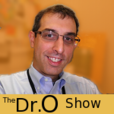
Summary: Hey folks! We are episode 17, and today's episode is going to be interesting because I am going to talk a little bit about GMO's, and the recent vote against Proposition 37 in California, which would require labeling of GMO foods. There are two issues here: (1) the issue of labeling, which would allow consumers information regarding what they are eating, and ultimately, give them the choice whether to choose GMO foods and (2) whether GMO's in general are safe, and should they be used at all. In regard to the first question, I was shocked and amazed that people voted against this proposition because it is unclear whether all GMO's that are used in foods are safe. GMO's may in fact, be harmful. Why wouldn't people want to know whether their foods have GMO's? It simply doesn't make any sense to me, and unfortunately, I don't know enough about what happened in California and how the argument was framed to the voters that led them to refuse this proposition. Information of what is GMO I feel could be very helpful, but as it stands, people are going to have to find out for themselves, if they can, or simply stay away from processed foods (which are generally contain GMO's) and get as much of their food from trusted sources, like CSA's. The other question is in regards to safety and utility. I do not believe that all GMO's are 'bad' and they do have a place in our society. Now, you might think that this is a very shocking thing to say because the general narrative that is applied to GMO's is to create a struggle between good and evil forces, where GMO's– specifically companies that make them like Monsanto – are evil. I think we really need to think carefully before we set up this moral battle that arouses all of our passions, invoking the grand duel between good and evil. I know that saying something like this may not get me the press like some of the health 'gurus' out there who are 'sounding the horn', but I do not believe in 'the man behind the curtain' fantasy that many of the 'gurus' out there keep building their empires upon. There is no secret knowledge that someone doesn't want you to know, there's only knowledge you do not choose to understand. To get any answers about GMO's and what role they can play, a person needs to think critically. And the fact is humans, especially since the dawn of agriculture, have been genetic modifiers because of their ability to selectively alter their environment through technology. I talk about this in the podcast in relationship to the fact that grains have been selectively bred to give them the characteristics that we want them to have, in order that we may include them in our diet. The same is the case with domesticated animals. As a result, humans may rail about the presence of GMO's, but the fact is, we are genetic modifiers, and we have been for a long time. And the fact of the matter is that not all GMO's are detrimental to human health, but may actually save lives. if you take, for instance, recombinant insulin, which my daughters use so they can live, I really appreciate that technology. I would like to explore it further in order to help other children who are suffering with diseases like cystic fibrosis. It may be controversial statement to say that I do not think that all GMO's are bad, and it is definitely controversial to say this among most dieters and diet circles, but GMO's have also saved many lives from starvation around the world. That being said, I am also not suggesting that GMO's should not be labelled, and some of them (maybe even many) have unintended consequences that may contribute to human disease. And this is what is so shocking really about Proposition 37 being rejected. There was no 'man behind the curtain' or secret cabal of greedy Monsanto executives conspiring in election fraud. People had the choice, and they decided that they didn't want or care to know. I think instead of making things easier to understand,
